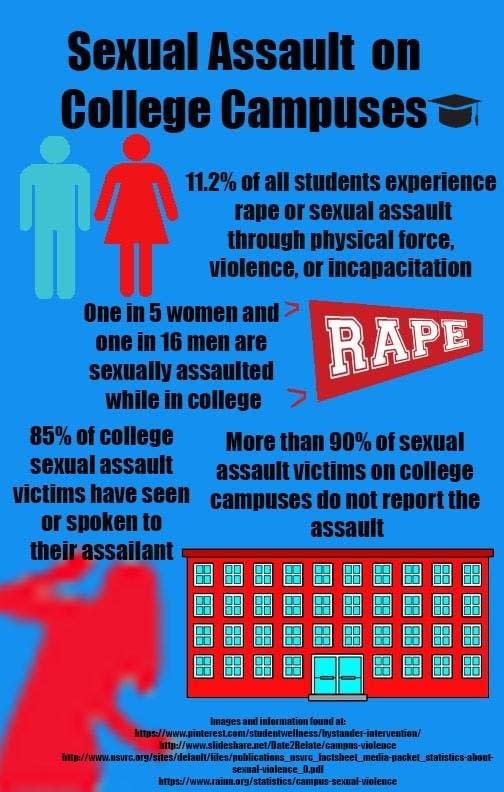Sexual assaults on college campuses have become an epidemic.
According to RAINN.org, a nonprofit dedicated to fighting sexual violence, 11.2 percent of all students’ experience rape or sexual assault through physical force, violence, or incapacitation, and 90 percent of college victims feel so ashamed that they never file a report.
Lawmakers in California hope to prevent another case like Brock Turner’s. Turner, you recall, is the former Stanford University student who was convicted of three counts of felony sexual assault, but only served three months of a six-month sentence.
California lawmakers hope to end this epidemic by approving a bill that requires a minimum prison sentence and bans probation for anyone convicted of sexually assaulting an unconscious or intoxicated person.
AB 2888 passed California’s assembly 66-0 on Aug. 29 and is waiting for Gov. Jerry Brown’s signature.
According to leginfo.legislative.ca.gov, the new measure would “prohibit a court from granting probation or suspending the execution or imposition of a sentence if a person is convicted of rape, sodomy, penetration with a foreign object, or oral copulation if the victim was either unconscious or incapable of giving consent due to intoxication.”
California hopes that felons convicted of such crimes will not have the chance to “get away” with their actions and fewer survivors will be discouraged from coming forward to report such actions, according to an article published in August by the Los Angeles Times.
But some college feminist groups believe the law doesn’t address problems such as how prospectors handle sexual assault reports and how minimum sentences will lead to more prison overcrowding, according to the Times article.
Even if states focused on refusal of probation or a minimum sentence, a suspected rape perpetrator is 60 percent more likely to be arrested within three years of their released date, according to RAINN.org.
The California bill is a big step in the right direction, but the way to actually stop sexual assaults on campuses is continuing education through the college years.
This is happening at some universities. In January 2015, Dartmouth College announced mandatory education on sexual violence prevention, according to dartmouth.edu. Prospective students at North Carolina’s Elon College must take an online course on alcohol’s effects on behaviors before they can even start their studies, according to elon.edu.
But what should college students be taught about sexual assaults on campus?
Education shouldn’t be only prevention-focused or teaching women how to defend themselves. By allowing education to focus primarily on teaching women how to protect themselves or on abstinence from alcohol, drugs and sexual activity, we are telling people to attack the “weaklings” and that women should feel shameful for wanting to consent to sexual activities.
Instead of wasting money on essentials for inmates and overcrowded prisons, states should focus on creating more sex education programs that teach students what consent is.
Silence, body movements, moans and grinding on the dance floor are not signs of consent. Students need to learn that if their partner doesn’t say yes and go through with their actions that it can lead to serious jail time.
The focus should be on teaching men and women what consent is and the hazards of binge-drinking in unfamiliar places, as well as promote bystander intervention.
To prevent sexual assaults on campuses, campuses must focus on continuing education throughout the years, empower the 90 percent of men who do not want to rape to intervene and create a safer environment for the victims who want to speak up.









![Pippin, played by Hunter Heart, leads a musical number in the second act of the musical. [Photo courtesy Kris Ikejiri]](https://therambler.org/wp-content/uploads/2025/04/Pippin-Review-1200x800.jpg)
![Harriet and Warren, played by Trinity Chenault and Trent Cole, embrace in a hug [Photo courtesy Lauren Hunt]](https://therambler.org/wp-content/uploads/2025/02/lettersfromthelibrary_01-1200x800.jpg)
![Samantha Barragan celebrates following victory in a bout. [Photo courtesy Tu Pha]](https://therambler.org/wp-content/uploads/2025/05/20250504_164435000_iOS-834x1200.jpg)





![Hunter Heart (center), the play's lead, rehearses a scene alongside other student actors. [Photo courtesy Jacob Sanchez]](https://therambler.org/wp-content/uploads/2025/04/thumbnail_IMG_8412-1200x816.jpg)
![Student actors rehearse for Pippin, Theatre Wesleyan's upcoming musical. [Photo courtesy Jacob Rivera-Sanchez]](https://therambler.org/wp-content/uploads/2025/04/Pippin-Preview-1200x739.jpg)
![[Photo courtesy Brooklyn Rowe]](https://therambler.org/wp-content/uploads/2025/05/CMYK_Shaiza_4227-1080x1200.jpg)

![Lady Rams softball wraps up weekend against Nelson Lions with a victory [6 – 1]](https://therambler.org/wp-content/uploads/2025/04/Screenshot-2025-04-04-100924-1200x647.png)
















